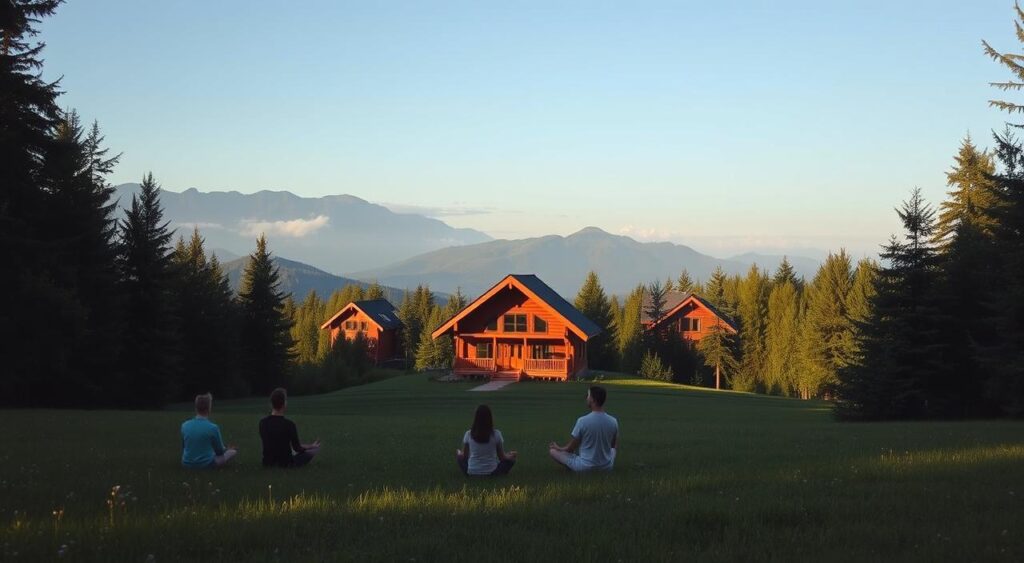Want a break from daily life? You might wonder if a weekend away or a week-long retreat is better for you. Each choice, including a study abroad program or other programs, has its own perks and caters to different needs, durations, and benefits for students. This comparison will help you figure out which is best for your lifestyle and goals. This article serves as a comprehensive resource for understanding the differences between short weekend getaways and week-long immersions, helping readers make informed decisions.
How long you go away for can really impact your travel plans. Weekend getaways are short and sweet, perfect for a quick recharge. Week-long retreats, however, let you dive deep into relaxation and exploration. Longer trips or programs, such as a week-long study abroad program, offer more immersion in different cultures, giving students a broader global perspective and deeper cultural understanding.
Whether you’re a busy bee needing a brief escape or someone craving a thorough experience, this guide will help you pick wisely.
Key Takeaways
- Weekend getaways and week-long retreats cater to different travel needs and schedules.
- Short getaways provide a quick escape without significant time commitments.
- Long retreats allow for more immersion and a broader global perspective, leading to more comprehensive experiences.
- Evaluate your personal goals to choose the most suitable retreat duration.
- Consider cost, time commitments, and desired outcomes in your retreat choice.
Introduction: What Are Weekend Getaways and Week-Long Retreats?
Weekend getaways and week-long retreats are two popular types of short-term trips that offer a refreshing break from the routines of daily life. To ensure a successful and enjoyable getaway or retreat, it’s important to start with the right idea or plan that fits your needs and goals. Whether you’re looking to step into new environments, recharge your energy, or simply experience something different, these trips provide an extraordinary opportunity to explore the world around you. From a quick escape to a nearby city to a full week spent discovering a new destination, both options allow you to create lasting memories and gain a fresh perspective. No matter your interests or schedule, taking time for a short term adventure can help you reconnect with yourself and the world, making every week a little more interesting.
Defining Weekend Getaways
A weekend getaway is all about making the most of a short break—usually from Friday to Sunday—to step away from the demands of everyday life. These trips are perfect for those who want to visit new places, attend local events, or simply enjoy a change of scenery without a big time commitment. Whether you’re interested in exploring a nearby city, hiking in the mountains, or sampling local cuisine, weekend getaways are designed to fit your interests and add a spark to your life. With just a couple of days, you can discover hidden gems, meet new people, and return home feeling refreshed and inspired.
Defining Week-Long Retreats
Week-long retreats take the travel experience a step further, offering a chance to fully immerse yourself in a new culture or environment. These trips are ideal for those who want to focus on personal growth, learn new skills, or simply take a deeper break from their usual routine. By spending a full week in a different setting, you can truly experience the local culture, build meaningful connections, and focus on what matters most to you—whether that’s wellness, creativity, or adventure. A week-long retreat gives you enough time to fully immerse in a new culture, embrace new ways of life, and return home with a renewed sense of purpose and focus.
Understanding the Appeal of Short Weekend Getaways
Weekend getaways give us a quick break from everyday life. These short trips help us clear our mind and rest our body, without needing lots of time or money. They are easy to plan and go on.
Similarly, short term programs, such as a summer program, are popular among students seeking quick, flexible international experiences without extensive time commitments.
Benefits of Quick Escapes
Short trips have lots of benefits. One key point is they don’t take much time. These trips often last just a few days or up to a couple of weeks, making them ideal for students and others with busy schedules who can only spare limited free time. Also, a brief getaway can lower stress and refresh you for the week ahead.
The change of scene and pace improves our mood and health. Plus, these trips are budget-friendly. So, you get to enjoy a mini-holiday without spending a lot.
Popular Weekend Destination Ideas
When thinking of a weekend trip, pick places that offer something different but are easy to get to. Coastal spots like Cape Cod, national parks like Yosemite, or lively cities such as New Orleans are great. These places boast unique sights and are a short journey away.
Whether you love chilling on a beach, hiking, or exploring city life, there’s an option for everyone. Incorporating day trips into your weekend getaway can maximize your experience by allowing you to explore nearby attractions.
Tips for a Successful Weekend Trip
To make the most of a weekend getaway, follow these useful tips:
- Flexible Booking: Keep your plans loose. This lets you adapt to any unexpected weather or changes in what you want to do.
- Light Packing: Pack light to avoid wasting time and energy. Just the basics—like versatile clothes and toiletries—are enough.
- Prioritize Activities: Decide what you really want to do in advance. Focus on doing a few things well, rather than trying to fit in too much.
- Early Departures: Leave early on Friday and come back late on Sunday. This way, you use every possible moment of your getaway.
Follow these strategies to enjoy a memorable and refreshing weekend break. This is key to the success of your weekend getaway and will help you come back re-energized, ready to face your regular life.
The Advantages of Week-Long Immersions
Week-long retreats are special because they let you dive deep into the location and its activities, providing cultural immersion. Spending extended periods in the host country allows for deeper integration into the local education system and culture. For some, a week-long immersion can be a stepping stone toward long-term ministry or ongoing involvement in the host community. They are not like quick weekend trips. These experiences help you explore places fully and make connections that last.
Deep Dives into Experiences
These retreats give a detailed look at culture and nature that’s unmatched. Longer retreats provide more opportunities to practice and learn new languages through daily interactions, allowing you to live like a local, join in traditions, and find spots only known to residents. Short visits don’t offer this depth.
Building Lasting Connections
Long retreats help you make real friendships. These connections often extend beyond fellow travelers to include members of the local community. Being with locals and other travelers for a week helps create bonds that last long after you leave. These strong connections make the retreat much richer.
Perfecting Your Skills Over Time
If you want to improve at something, immersive retreats are great. Whether it’s language skills, yoga, or cooking skills, you get lots of time. This means you can practice a lot, get feedback, and really see your skills grow. Programs that last an academic year offer even greater opportunities for skill mastery and personal growth.
Planning Your Escape: Research, Goal-Setting, and Logistics
A successful weekend getaway or week-long retreat starts with careful planning and thoughtful research, often guided by the study abroad office . Taking the time to consider your destination, safety, and logistics can make all the difference in creating a memorable and stress-free experience. Whether you’re planning a short term trip or a week-long adventure, setting clear goals and understanding your options will help you make the most of your time away.
Research and Goal-Setting for Your Trip
Before you set off on your next trip, it’s important to do your research and set clear goals for what you want to achieve. Start by learning about your destination—explore the local culture, find out about must-see attractions, and look into unique experiences that match your interests. Careful planning can help you create a trip that encourages profound personal growth, whether you’re aiming to improve your language skills, make academic progress, or simply enjoy a meaningful cultural exchange.
Think about what you want to get out of your trip: Are you hoping for cultural immersion, a chance to practice a new language, or simply a relaxing break in a new environment? Setting these goals will help you focus your planning and ensure that your trip is both enjoyable and enriching. By researching your destination and considering your personal growth objectives, you can create a travel experience that not only meets your needs but also opens the door to new cultures, ideas, and opportunities for learning.
Cost Comparison: Weekend vs. Week-Long
Comparing costs of different retreat lengths is crucial for making smart choices. For weekend versus week-long retreats, think about all costs, including whether you choose a private room, which can increase expenses but may enhance comfort and privacy during your stay. This ensures your money plans fit with your vacation dreams.
Budgeting for Short Getaways
Weekend escapes are great for relaxing without spending a lot. You need to consider accommodation, meals, and fun activities. These expenses happen in just a few days.
To plan your budget well, pay attention to key expenses:
- Accommodation: Find cheap hotels or use services like Airbnb for a stay. Some options provide access to all the facilities, which can add value to your stay.
- Transportation: Shorter trips are usually cheaper, so figure out costs for gas or budget-friendly flights.
- Meals: Eating out is fun, but watch how much you spend.
- Activities: Pick a few must-do things to avoid spending too much.

Financial Commitment of Extended Retreats
Planning for a week-long retreat means covering more, including classes or special activities. Some retreats also include support services, such as on-site assistance or guidance, which can be an important factor in the overall cost.
You’ll need to think about these expenses:
| Expense Category | Considerations |
| Accommodation | Look for deals that include meals and activities to save money. |
| Transportation | Longer stays could mean farther travel, so plan for higher travel expenses. |
| Classes and Activities | Compare bundled activities with separate pricing for the best deal. |
| Meals | Consider resorts or cook at your rental to cut costs. |
Understanding these aspects helps you budget for any retreat. Whether it’s a quick getaway or a longer adventure, planning is key.
Time Commitment Analysis
Learning to manage time commitment retreats boosts your experience. This applies to both weekend getaways and week-long stays. For week-long or longer retreats, long haul planning is essential to ensure you can fully commit to the experience. It’s crucial to plan well to enjoy every second outside your daily life.
Planning Your Weekend Escape
Weekend retreats are ideal for a quick refresh, especially when your time is limited. The key is to plan smart—focusing on a few meaningful activities can help maximize your limited time. Choose the activities and places you want to visit. Opt for retreat stay options that balance activities and rest well. By scheduling times for fun, relaxation, and travel, you’ll make the most of your short break.
Allocating Time for a Week-Long Retreat
For a longer getaway, fitting this time into your schedule is vital. Let your workplace know early so leaving and returning goes smoothly. Choose retreat program lengths that fit full schedules, whether you’re there for health, learning new skills, or seeking adventure. While a week-long retreat is a significant commitment, some programs require a full academic year for maximum immersion.
Time-Off Considerations
Planning is key for both short and long retreats. Make sure to ask for time off work ahead of time. Include extra days for getting ready and easing back into your regular life. This makes your time commitment retreats more rewarding, and planning for a smooth transition when returning home is also important for a fulfilling experience.
Who Should Choose a Weekend Getaway?
Various groups find weekend getaways ideal. They provide a break and a chance for spontaneous trips. Each group benefits differently from short escapes.
Ideal for Busy Professionals
Busy professionals benefit greatly from weekend trips. They help you relax, recharge, and return to work energized. You don’t have to disrupt your work much.
Families Looking for Quick Breaks
Weekend getaways are a great way for the whole family to spend quality time together. Families with tight schedules love weekend getaways. They offer a chance to bond and make memories without long planning. Parents can relax and still get back to routine quickly.
Spontaneous Travellers
Spontaneous travelers love the thrill of quick trips. They enjoy the freedom and flexibility. Weekend trips are perfect for exploring new places without much planning. These trips are relaxing and fun.
When to Opt for a Week-Long Retreat
Choosing a week-long retreat has many benefits. It’s perfect for those wanting a deep dive into a new culture, offering a study abroad experience in miniature. In just one week, you can gain deep cultural and personal growth similar to longer immersive programs. You can explore your passions, refresh yourself, and grow personally.
Perfect for Serious Hobbyists
If you love a hobby, a week-long retreat is great. Many retreats offer specialized program offerings tailored to different hobbies and interests, including learning the local language allowing you to choose the best fit for your passion. Whether it’s art, cooking, or photography, this retreat helps you focus and improve.
With a week, you notice real progress in your skills.
Health and Wellness Advocates
For health and wellness fans, these retreats are a dream. They offer a full way to improve your health. You get to leave bad habits, try new wellness practices, and change for the better.
A longer stay means more time to relax and get better.
Personal Development Seekers
Week-long retreats are great for self-growth. They often encourage students to step out of their comfort zones and pursue new personal development opportunities. These retreats have workshops and courses that go deep. You can learn about leadership, mindfulness, or art deeply.

Popular Types of Weekend Getaways
Understanding different types of weekend getaways is key to planning your retreat. You can pick from nature escapes, cultural trips, or pampering sessions. Mission trips are another type of weekend getaway, offering opportunities for service and cultural exchange. There’s something for everyone.
Nature Escapes and Outdoor Adventures
If you want to escape the busy world, nature getaways are perfect. You can hike, camp, and see wildlife. Places like Yellowstone and Yosemite have amazing views for outdoor activities.
Urban Explorations with Cultural Flair
Cultural trips to cities offer fun in history, art, and city life. Exploring a city’s host culture through its museums, art, and cuisine can deepen your understanding of the destination. You can visit museums, see plays, and try famous restaurants. Cities like New York and Chicago are great for cultural adventures.
Spa Retreats and Relaxation
If you’re aiming to relax, spa retreats are ideal. They offer massages, facials, and other wellness treatments. Luxury places like Ojai Valley Inn and The Greenbrier are perfect for being pampered.
Notable Week-Long Retreat Destinations
Looking for relaxation, creative inspiration, or adventurous fun? The world is full of week-long retreats for all interests, and many of these retreats offer an international experience, allowing participants to immerse themselves in new cultures and environments. Find retreats perfect for wellness lovers, artists, and thrill-seekers.
Yoga and Wellness Retreats
In places like Bali and Thailand, yoga retreats offer peace and mindfulness. They provide daily yoga, meditation, and healing practices. Imagine relaxing in beautiful landscapes, revitalizing your body and spirit.
Creative Workshops and Learning Retreats
Dive into your passions at creative workshops in places like Italy and France. These week-long retreats provide a unique form of education, blending creativity with cultural immersion. They help sharpen your arts skills and connect you with people who share your interests.
Adventure Travel
If you crave excitement, adventure travel retreats in a new country like those in South America are ideal. Experience the Amazon, hike the Andes, or enjoy thrilling water sports. These places offer unforgettable adventures, unique landscapes, cultural experiences, and the joy of new achievements.
| Type of Retreat | Popular Destinations | Activities Included |
| Yoga and Wellness Retreats | Bali, Thailand | Yoga, Meditation, Holistic Healing |
| Creative Workshops | Italy, France | Painting, Writing, Photography |
| Adventure Travel | South America | Hiking, Water Sports, Exploration |
Modern Alternatives: Virtual Programs and Remote Retreats
As the world becomes more connected, virtual programs and remote retreats have emerged as innovative ways for students to experience cultural immersion and personal growth without leaving home. These modern alternatives to traditional study abroad programs open up new possibilities for engaging with different cultures and languages, making global experiences more accessible than ever before. Whether you’re interested in studying abroad but can’t travel, or you’re looking for a flexible way to expand your horizons, virtual programs offer students a unique path to personal and academic development.
Exploring Virtual Retreats and Online Immersion Experiences
Virtual retreats and online immersion experiences are designed to help students fully immerse themselves in the host culture, even from afar. Through interactive online platforms, students can participate in virtual day trips, attend local events, and engage in cultural exchange activities that bring different cultures to life. These programs often include language practice sessions, workshops, and discussions with locals, allowing students to explore new cultures and languages in a dynamic, engaging way.
One of the key advantages of virtual programs is their flexibility. Students can tailor their experience to fit their academic needs, choosing from a variety of programs that align with their interests and goals. Whether you want to focus on language learning, cultural studies, or specific academic subjects, virtual retreats can be customized to provide a meaningful and enriching experience. By participating in these programs, students can gain a deeper understanding of different cultures, develop new language skills, and build connections with peers from around the world—all from the comfort of home.
Pros and Cons of Virtual vs. In-Person Programs
While virtual programs offer a convenient and accessible way to experience cultural immersion, they do come with some trade-offs. One of the main challenges is the lack of direct, face-to-face interaction with the host culture, which can make it harder to fully immerse yourself in daily life and local traditions. However, with careful planning and creative program design, virtual experiences can still provide profound personal growth and meaningful cultural exchange.
On the other hand, in-person programs allow students to fully immerse themselves in the host culture, offering hands-on experiences and deeper connections with local communities. These programs often require a greater time commitment and can be more expensive, but they provide opportunities for students to create lasting memories and develop a strong sense of global citizenship.
Ultimately, the choice between virtual and in-person programs depends on your personal goals, schedule, and resources. Both options can lead to significant personal growth and a broader understanding of the world, so it’s important to consider what type of experience will best help you achieve your academic and personal aspirations.
Blending Work and Leisure: The Rise of Working Vacations
The concept of working vacations, or “workcations,” is transforming the way students approach travel and cultural immersion. By combining remote work with the opportunity to experience a new culture and language, working vacations offer a flexible and enriching alternative to traditional study abroad programs. With advances in digital technology, students can now work from almost anywhere, making it possible to balance professional responsibilities with the excitement of exploring a new destination.
How to Make the Most of a Working Vacation
To ensure a successful working vacation, careful planning is essential. Start by thoroughly researching your destination to make sure it meets your needs for both work and leisure. Look for accommodations that provide all the facilities you’ll need, such as a private room, reliable internet access, and comfortable workspaces. This will help you stay productive while also giving you the freedom to fully immerse yourself in the local culture during your downtime.
Balancing work and leisure is key to making the most of your experience. Set clear boundaries for your work hours and make time for regular breaks to recharge and explore your surroundings. Take advantage of local events, cultural activities, and opportunities to practice the local language—these experiences will enrich your stay and contribute to your personal growth and global perspective.
It’s also important to consider your academic progress and how a working vacation fits into your academic year. Consult with your academic advisors to ensure your plans align with your academic needs and long-term goals. By doing so, you can create an extraordinary opportunity that supports both your education and your personal development.
Finally, don’t overlook the importance of safety and risk management. Make sure you have a plan in place to prevent risk, including understanding local safety guidelines and having a financial plan for unexpected expenses. With thoughtful preparation, a working vacation can be a unique and rewarding way to combine work, travel, and cultural immersion—helping you grow personally and academically while gaining a truly global perspective.
Making the Right Choice for You
Choosing between a short weekend or a long week retreat depends on your life, goals, and time. Choosing the right retreat is one of the most important decisions you can make for your personal growth. It’s key to decide what you hope to get from the retreat.
Weighing your options carefully is crucial for making important decisions about your travel plans. This way, you can pick the best option for you.
Assessing Your Needs and Schedules
First, think about what you need and when you’re free. Do you want a quick stress relief or a longer, deeper experience? Look at how much time you can give to a retreat. Also, consider your academic needs—make sure the timing of the retreat fits with your coursework, graduation requirements, and other academic commitments. A weekend might work best if you’re busy. But, if you’re more free, a week-long retreat could give you more benefits.
Setting Personal Goals for Retreats
It’s important to know what you want from a retreat. For relaxation, a weekend may be enough. But for learning something new or personal growth, you might need more time. Think about your goals to help choose the right length.
As advice, set realistic and meaningful goals by considering your available time, your personal needs, and what you hope to achieve during the retreat.
Combining Weekend and Week-Long Experiences
If you want both short and long retreats, it’s possible. The discussion of short weekend getaways vs week long immersions weighing time commitments shows that weekend trips give quick breaks. Week-long retreats offer a chance for deeper experiences. Combining both types of retreats allows you to experience the best of both worlds.
FAQ
What are the benefits of quick weekend getaways?
Quick weekend trips are great for those with busy lives. They don’t require much time or money. You get to relax, see new places, and take a break from daily stress.
Can you suggest popular destinations for a weekend trip?
For a weekend away, try coastal towns, national parks, or lively nearby cities. Visiting new destinations, even for a short time, can provide a refreshing change of scenery. These spots are easy to get to and perfect for a quick escape.
How can I maximize my experience on a weekend getaway?
To get the most out of your trip, book flexibly, pack only what you need, and do what you love. You can possibly enhance your experience by seeking out unique local events or activities. This way, you’ll enjoy every moment.
What are the advantages of a week-long retreat?
A week-long retreat lets you dive deep into the culture. There are many week-long programs designed to help you learn new skills and connect with others, such as surfing or cooking.
How do week-long retreats help in building lasting connections?
Spending a week together builds bonds with locals and other travelers. These connections can last long after you’ve returned home, often providing ongoing support and building a community even after the retreat ends.
What skills can be perfected during a week-long retreat?
You have enough time on a week-long retreat to get better at hobbies like surfing or yoga. It’s great for learning in a deeper way. Consulting academic advisors can also help you choose retreats that align with your skill development goals.
How do the costs of weekend getaways compare to week-long retreats?
Weekend trips cost less because they’re shorter. But week-long retreats might include lessons and activities, making them more expensive overall. For some educational retreats, your home institution may cover part of the costs, so it’s worth checking with them before making a decision.
What are some budgeting strategies for short getaways?
To save money on short trips, look for cheap places to stay, grab deals, and plan free or cheap things to do. Additionally, many home institutions offer resources or guidance to help students budget for academic retreats, ensuring that your trip is both affordable and aligned with your educational goals. This helps you enjoy your trip without spending too much.
How can travelers manage time commitments for both retreat types?
With weekend getaways, plan well to use your time wisely. For longer stays, figure out how to take time off and enjoy the retreat fully. The study abroad office can help you plan and manage your time commitments for international programs.
Who benefits most from weekend getaways?
Weekend trips are best for those with busy jobs, families, or those who decide to travel last-minute. They’re an easy way to relax quickly.
When should individuals opt for a week-long retreat?
Choose a week-long retreat if you’re serious about getting better at a hobby, need a full break, or want to grow personally with special courses. While week-long retreats are beneficial, some individuals may seek long term work ministry or extended service opportunities for deeper impact.
What types of activities are popular for weekend getaways?
People love hikes, camping, exploring cities for museums and food, or spa stays to relax on weekend trips. Participating in a mission trip is another meaningful way to spend a weekend getaway, offering opportunities for service, cultural exchange, and personal growth.
What are some notable week-long retreat destinations?
For a week away, consider a week-long study abroad program such as yoga in Bali, creative classes in Europe, or adventures in South America. Each study abroad program offers something special and immersive for a short-term experience.
How can I make the right choice for my retreat needs?
Think about what you need and when you’re free. Set goals for your retreat. Consider safety measures to prevent risk as an important part of choosing the right retreat. Sometimes, mixing short and long stays works best.






